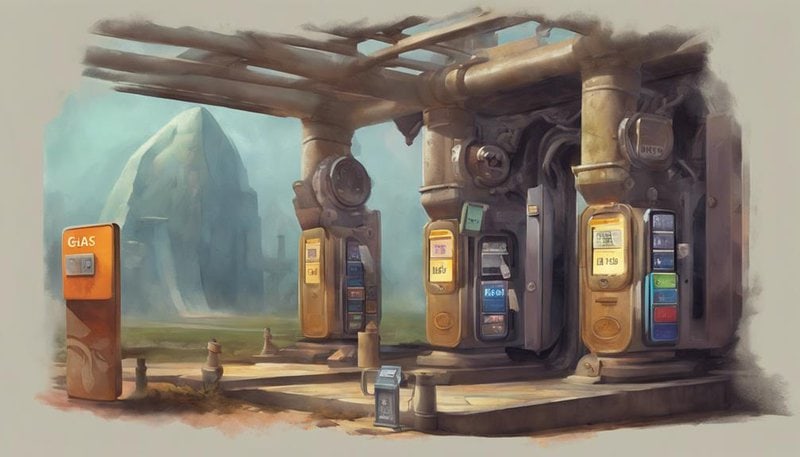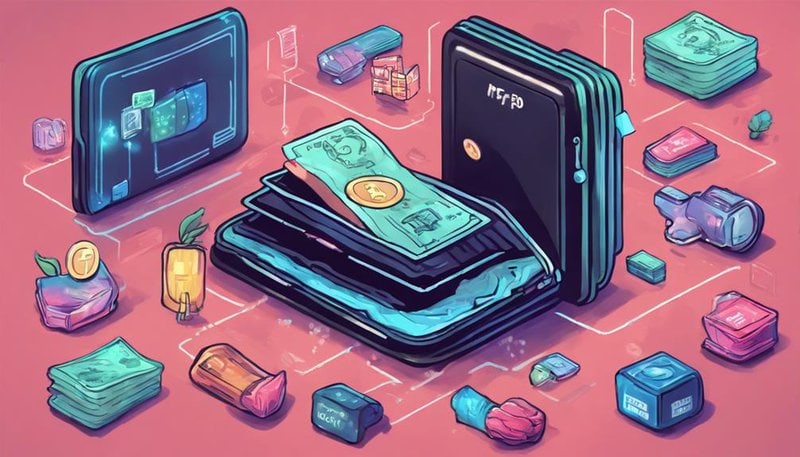What Is Gas Fee in NFT Transactions? Understanding Costs

Gas fees in NFT transactions are transaction costs associated with making trades on the blockchain.
Understanding gas fees is crucial for optimizing your financial strategies in the digital art market.
The Basics of Gas Fees
In the world of blockchain transactions, understanding the basics of gas fees is essential for navigating the realm of NFT transactions with financial acumen. Gas fee dynamics play a crucial role in determining the cost of processing transactions on the blockchain. These fees are paid to miners to validate and execute transactions on the network.
When engaging in NFT transactions, being mindful of gas fees is paramount as they can vary based on network congestion and the complexity of the transaction.
Fee comparison is a valuable practice when dealing with gas fees in NFT transactions. Different blockchain networks have varying fee structures, and it's wise to compare these fees before initiating a transaction. By conducting a fee comparison, you can optimize your costs and make informed decisions regarding your NFT transactions.
Why Gas Fees Matter
Navigating the intricate world of NFT transactions requires a keen understanding of why gas fees hold significant importance. In this realm where every transaction carries weight, grasping why gas fees matter can lead you towards a path of cost efficiency and fee management.
- Cost Efficiency: Gas fees directly impact the overall cost of engaging in NFT transactions. Understanding how to optimize these fees can result in significant savings over time.
- Fee Management: Managing gas fees effectively involves balancing the costs associated with transactions against the benefits gained from them. It requires a strategic approach to ensure that fees don't outweigh the value of the transaction.
- Transaction Prioritization: Gas fees can affect the speed at which your NFT transactions are processed. Prioritizing transactions based on fee levels can help you achieve a balance between cost and transaction speed.
Factors Influencing Gas Costs

As you navigate the realm of NFT transactions, understanding the factors influencing gas costs is crucial. Delve into the intricate world of gas fee calculations, where the nuances can significantly impact your overall expenses.
Be mindful of network congestion's influence and explore optimization strategies to navigate these costs efficiently.
Gas Fee Calculation
Understanding the intricate factors that influence gas costs in NFT transactions is crucial for navigating the realm of digital collectibles effectively. When delving into gas fee calculation, consider these essential aspects:
- Gas fee optimization: Fine-tuning your transaction parameters can help reduce gas costs and enhance efficiency.
- Fee comparison analysis: Comparing gas fees across different platforms or times can aid in making cost-effective decisions.
- Smart contract complexity: The complexity of the smart contract being executed directly impacts the gas fees incurred.
Network Congestion Impact
To comprehend the impact of network congestion on gas costs in NFT transactions, one must delve into the intricate interplay of various factors. Congestion management plays a pivotal role in determining the level of gas fees incurred during transactions.
When the network experiences high traffic, fees tend to increase due to the limited space available for processing transactions. Moreover, fee comparison becomes essential to ensure optimal cost-effectiveness. By comparing fees across different times and platforms, you can make informed decisions on when to execute transactions to minimize costs.
Understanding these dynamics empowers you to navigate the complexities of network congestion and make strategic choices that align with your financial goals.
Gas Optimization Strategies
Embark on a journey of mastering gas optimization strategies by unraveling the key factors that influence gas costs in NFT transactions.
- Gas fee reduction tactics: Implement smart contract codes efficiently to reduce the gas needed for execution.
- Optimization techniques: Batch transactions where possible to consolidate operations and save on gas fees.
- Minimizing transaction costs: Consider executing transactions during off-peak hours to avoid network congestion and high gas prices.
Gas Fees Vs. Transaction Speed

Consider the intricate dance between gas fees and transaction speed in the realm of NFT transactions. Your decisions regarding gas fees directly influence the swiftness and efficiency of your transactions.
To achieve a harmonious balance, skillfully navigate the trade-off between costs and the time it takes for your transactions to be processed.
Cost Impact on Speed
Navigating the world of NFT transactions, one must grasp the direct correlation between gas fees and transaction speed in order to optimize cost efficiency and operational velocity.
Understanding how costs impact speed is essential for achieving seamless transactions. Here are key points to keep in mind:
- Cost Optimization: Balancing gas fees with transaction speed is crucial for cost efficiency.
- Transaction Delays: Higher gas fees can expedite transactions, reducing delays.
- Operational Velocity: Finding the right balance between cost and speed enhances operational efficiency, ensuring a smooth NFT transaction experience.
Mastering the interplay between gas fees and transaction speed empowers you to navigate the digital marketplace with finesse and precision.
Efficiency Trade-Off Analysis
To achieve optimal efficiency in NFT transactions, carefully weighing the trade-offs between gas fees and transaction speed is paramount. Efficiency versus cost is a delicate balance that necessitates strategic decision-making.
While lower gas fees may seem attractive, they could lead to slower transaction speeds, potentially affecting your overall experience. Conversely, prioritizing transaction speed might incur higher costs in gas fees. Therefore, employing optimization techniques becomes crucial.
Balancing Fees and Time
Achieving optimal efficiency in NFT transactions requires a fine balance between gas fees and transaction speed, a delicate interplay that demands astute decision-making. When navigating the realm of fee optimization and time cost balance, consider these insights:
- Strategic Planning: Deliberately assess the urgency of the transaction against the associated gas costs.
- Real-Time Monitoring: Stay vigilant and adapt to fluctuating gas fees to capitalize on cost-efficient opportunities.
- Smart Contract Selection: Opt for contracts that align with your priorities, whether speed or cost savings.
Strategies to Minimize Gas Fees

Mastering the art of optimizing gas fees can significantly enhance your NFT transaction efficiency. To minimize gas fees, consider employing various gas fee reduction techniques. One effective method is to execute transactions during off-peak hours when network congestion is lower, resulting in reduced fees. Additionally, consolidating multiple transactions into a single batch can help save on gas costs by reducing the number of interactions with the blockchain.
Another crucial strategy is to compare gas fees across different platforms before initiating transactions. By evaluating fee structures on various NFT marketplaces or platforms, you can choose the one that offers the most cost-effective option for your transactions. Keep an eye out for platforms that utilize layer 2 solutions or alternative blockchains, as these may provide lower gas fees compared to using the Ethereum network directly.
Understanding Gas Fee Structures
In navigating the realm of NFT transactions, understanding the intricate structures of gas fees is akin to deciphering a hidden language that dictates the cost dynamics of your interactions with the blockchain. To shed light on this complex system, consider the following:
- Gas Fee Comparison: Compare gas fees across different platforms to make informed decisions about where to conduct your transactions.
- Fee Reduction Techniques: Explore various techniques such as executing transactions during off-peak hours or bundling multiple transactions together to reduce overall gas costs.
- Optimizing Gas Usage: Delve into ways to optimize your smart contracts and transactions to minimize unnecessary gas consumption and, consequently, lower fees.
Gas Fees in Popular NFT Platforms

Exploring the gas fee structures within popular NFT platforms reveals a critical aspect of managing transaction costs in your blockchain interactions. When navigating the realm of NFTs, understanding the nuances of gas fees becomes imperative. Different platforms may vary in their fee structures, impacting the overall cost of your transactions. Conducting a gas fee comparison among these platforms can help you make informed decisions to optimize your expenses.
Moreover, familiarizing yourself with fee reduction techniques can further enhance your efficiency in managing gas fees. Some platforms may offer specific strategies or tools to mitigate these costs, allowing you to maximize the value of your NFT transactions. By staying informed and proactive in exploring these options, you can navigate the intricacies of gas fees with greater ease and effectiveness. Remember, every transaction is an opportunity to refine your approach and ensure that your interactions within the blockchain ecosystem are both cost-effective and rewarding.
Gas Fee Trends and Future Outlook
To navigate the evolving landscape of NFT transactions effectively, one must stay attuned to the shifting trends and future projections of gas fees. Understanding the nuances of gas fee pricing is vital for making informed decisions in the realm of NFTs. Here are some key points to consider:
- Fluctuating Gas Fee Pricing: Gas fees are subject to constant change based on network congestion and demand. Monitoring these fluctuations can help you optimize your transaction costs.
- Impact of Emerging Technologies: Advances in blockchain technology, such as Layer 2 solutions and Ethereum upgrades like EIP-1559, hold the promise of reducing gas fees. Keeping an eye on these developments can provide insights into potential cost-saving opportunities.
- Future Outlook: The future of gas fees in NFT transactions is likely to see a continued focus on scalability and efficiency. As the industry evolves, innovative solutions are expected to address the challenges posed by high gas fees, paving the way for a more sustainable and cost-effective NFT ecosystem.
Frequently Asked Questions
Are Gas Fees Fixed Across All NFT Transactions, or Do They Vary Based on the Specific Platform or Transaction Type?
Gas fees aren't fixed; they vary across platforms and transaction types. Comparing gas fees can impact your profitability on different platforms. Be wise in understanding these differences to maximize your gains and minimize costs.
How Do Gas Fees Impact the Overall Cost and Profitability of NFT Transactions for Both Buyers and Sellers?
In the world of NFT transactions, gas fees can greatly affect your profitability. These fees impact the overall cost and transaction speed, making it crucial to consider them when buying or selling to optimize your gains.
Can Gas Fees Be Negotiated or Adjusted in Any Way, or Are They Solely Determined by the Network and Transaction Volume?
In the realm of decentralized networks, gas fees are set by the system, untouched by negotiations. Transaction volume, a key player, can impact fees. Remember, understanding this dynamic aids in making informed decisions in your NFT ventures.
Are There Any Alternative Methods or Technologies Being Developed to Reduce or Eliminate the Need for Gas Fees in NFT Transactions?
Explore emerging gas fee alternatives and fee reduction technologies in NFT transactions. Innovations aim to lessen or eliminate gas fees, enhancing accessibility and affordability for all participants. Stay informed and engaged for a smoother transaction experience.
How Do Gas Fees Compare to Traditional Payment Processing Fees in Terms of Cost and Efficiency for NFT Transactions?
When comparing gas fees to traditional payment processing fees, consider the cost comparison and efficiency analysis. Gas fees can vary widely and are influenced by network demand, potentially affecting cost and speed in NFT transactions.











